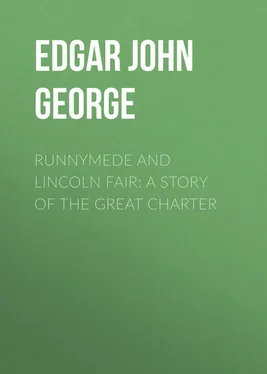John Edgar - Runnymede and Lincoln Fair - A Story of the Great Charter
Здесь есть возможность читать онлайн «John Edgar - Runnymede and Lincoln Fair - A Story of the Great Charter» — ознакомительный отрывок электронной книги совершенно бесплатно, а после прочтения отрывка купить полную версию. В некоторых случаях можно слушать аудио, скачать через торрент в формате fb2 и присутствует краткое содержание. Жанр: foreign_antique, foreign_prose, на английском языке. Описание произведения, (предисловие) а так же отзывы посетителей доступны на портале библиотеки ЛибКат.
- Название:Runnymede and Lincoln Fair: A Story of the Great Charter
- Автор:
- Жанр:
- Год:неизвестен
- ISBN:нет данных
- Рейтинг книги:3 / 5. Голосов: 1
-
Избранное:Добавить в избранное
- Отзывы:
-
Ваша оценка:
- 60
- 1
- 2
- 3
- 4
- 5
Runnymede and Lincoln Fair: A Story of the Great Charter: краткое содержание, описание и аннотация
Предлагаем к чтению аннотацию, описание, краткое содержание или предисловие (зависит от того, что написал сам автор книги «Runnymede and Lincoln Fair: A Story of the Great Charter»). Если вы не нашли необходимую информацию о книге — напишите в комментариях, мы постараемся отыскать её.
Runnymede and Lincoln Fair: A Story of the Great Charter — читать онлайн ознакомительный отрывок
Ниже представлен текст книги, разбитый по страницам. Система сохранения места последней прочитанной страницы, позволяет с удобством читать онлайн бесплатно книгу «Runnymede and Lincoln Fair: A Story of the Great Charter», без необходимости каждый раз заново искать на чём Вы остановились. Поставьте закладку, и сможете в любой момент перейти на страницу, на которой закончили чтение.
Интервал:
Закладка:
“Sir citizen,” said the young noble, speaking for the first time, “these are old stories, and such crimes as you impute to the Earl of Essex cannot be laid to the charge of the barons forming the army of God and the Church.”
Joseph Basing was about to answer sharply, but Constantine Fitzarnulph indicated by a gesture his desire to be heard, and there was silence.
“My friends,” said Fitzarnulph, in a tone which he hoped would prevent any argument, “it seems to me that this discourse is unprofitable, and that it would be more to the purpose to come to a decision on the point we are met to decide. The barons calling themselves the army of God and the Church are at Bedford, ready to march to London, if assured of a favourable reception in the city. Such reception we here assembled have influence sufficient to secure, if we so will it; and there is here present a young Norman noble – Walter de Merley by name – who is ready to carry your decision to them as rapidly as horse can carry him. Is it your desire – yea or nay – that the army now at Bedford should march to London?”
Joseph Basing was silent: all the others with one accord shouted “Yea;” and, almost as the sound ceased, Walter de Merley, having exchanged signals with Fitzarnulph, vanished from the hall.
“By our Lady of Newminster,” said the young warrior, as he mounted his steed and set its face towards Bedford, “it was no more than prudent to make these citizens pledge themselves to secrecy by an oath which they cannot break without risking eternal perdition. Not one of them but will waken up at sunrise to-morrow, repenting of and trembling at the recollection of the scene that has just been enacted.”
And while he rode on, congratulating himself on the success of Fitzarnulph’s attempts to induce the leading citizens of London to make the cause of the barons their own, the doors of Fitzarnulph’s hall were thrown open; and wine and spices were served to the guests; and each departed to his own home to seek repose, and probably to dream of the danger in which he might be involved should the secret ooze out before the arrival of “the army of God and the Church.”
CHAPTER XII
THE BARONS IN LONDON
FITZARNULPH’S project prospered.
Everything was managed with secrecy and success. On being assured that they might count on a hearty welcome from the Londoners, the barons left Bedford, and advanced to Ware, in Hertfordshire; and, while the royalists knew nothing of their movements, save from vague and uncertain rumours, they, on Saturday, the 16th of May, left Ware after sunset, and, marching all night, found themselves in the neighbourhood of the capital without a foe having appeared to notice their approach.
It was early on Sunday when the baronial warriors reached the walls of London, and Aldgate stood open to admit them. At the time, the inhabitants were for the most part at morning mass, and the nobles and their fighting men entered the city, and took possession of the gates, at each of which they posted parties of guards, almost ere their presence was suspected by the royalists, and long before their arrival was announced at the Tower. No sooner did they find themselves in undisputed possession of the capital, and assured of the support of the chief citizens, than they gratified the prejudices of the populace by falling upon a race who from their position always suffered early in civil commotions.
At that time the Jews were odious to Christendom, and doubtless did much to deserve hatred. But to no people in Europe was the Jew, with his sensual lip, his hook nose, his peculiar features, his high square yellow cap, and his russet gabardine, an object of so much dislike and distrust as to the English. For all this antipathy there were various reasons.
Almost every Jew was understood openly or secretly to revile and insult Christianity, and scarcely a year passed without some terrible charge being made against the race in this respect. One year it was said that a Jew had stabbed the Host; in the next that a Jew had defaced an image of the Virgin; in the third that a Jew had crucified a boy, in mockery of the Saviour. At the time of the Crusades such charges became more frequent than ever; for the Jews were believed to sympathise strongly with the Saracens, and to show their sympathy by furnishing arms to carry on the war, poisoning the wells and fountains at which the armed pilgrims were likely to quench their thirst, and sneering at the zeal which prompted Christians to “take the staff and sandal in superstitious penance, and walk afoot to visit the graves of dead men.”
No doubt these circumstances would of themselves have rendered the Jew an object of hatred wherever he appeared; but there were other and very strong reasons for the detestation with which men of the Hebrew race were regarded by the multitude. Almost every Jew was rich, and a money-lender, and a usurer, and was in the habit of using his advantages in such a way as to grind the faces of men of all ranks who were under the necessity of coming to him for aid. Abbots and barons were his debtors; but it was not merely the inmate of the monastery and the castle who experienced his rapacity and atrocities. While the abbot pledged his plate, and the baron his armour and horses, the craftsman pledged his tools, the trader his wares, and the husbandman his ploughshare. Of course, all these men were frequently at the Jew’s mercy, and most of them found, to their severe experience, that the mercy of a Jew was worse than the cruelty of a Christian.
No sooner, therefore, did the barons forming “the army of God and the Church” find themselves in London, and in a position to do whatever they pleased with the city, than they proceeded to pay off some of their debts to the Jews after a fashion which was little to the taste of the Israelites. Proceeding with such intent to the Jewry – the quarter set apart for and inhabited by the Jews, and remarkable as concerned the construction of the houses, which were of a peculiar style, with a chimney over the door, a mode of building to which the persecuted race were compelled to adhere, in order that their dwellings might be distinguished from those of Christians – they stopped at one of them, over which was inscribed in Hebrew characters, “This is the station or ward of Rabbi Moses, son of the honourable Rabbi Isaac,” and, to the terror of the inmates, began to tear down the building, not forgetting in the meantime to look out for plunder, and to lay their hands on all that was not too hot or too heavy to carry away. Proceeding with the work of destruction, which some were foolish enough to mistake for doing God service, the baronial insurgents pulled down the houses of all the principal Hebrews, and had the stones carried away to repair the gates of London, especially Ludgate and Aldgate – which had so easily admitted them, but which they were determined should not admit any other armed force, save at their pleasure – rebuilding them after the Norman fashion, with small bricks and Flanders tiles. Nearly four centuries later, when Ludgate was pulled down, and when, to borrow the words of the poet, when their names were forgotten, and the places that had once known them knew them no more, and their lands had become the prey of the grooms and minions who pandered to the passions and obeyed the behests of the Tudor sovereigns, the stone which had been taken from the house of the Rabbi Moses was discovered, and the inscription interpreted – an interesting memorial of other days, and one which might have suggested salutary reflections.
“The knights were dust,
And their swords were rust – ”
Having dealt with the Jews, the Anglo-Norman barons, resolute in their plan of going all lengths till their demands were complied with, took two important steps. First, they wrote to all the lords and knights throughout England demanding aid, and declaring plainly their intention to regard as enemies and punish as traitors all who did not support “the army of God and the Church;” next, they boldly quashed all scruples as to assailing a feudal superior, and prepared to besiege the king in the Tower, and got ready their engines of war to commence operations. But by this time John’s alarm had got the better of his rashness; and, changing his tactics, he, instead of bidding defiance to the confederates as before, determined on an attempt to delude them.
Читать дальшеИнтервал:
Закладка:
Похожие книги на «Runnymede and Lincoln Fair: A Story of the Great Charter»
Представляем Вашему вниманию похожие книги на «Runnymede and Lincoln Fair: A Story of the Great Charter» списком для выбора. Мы отобрали схожую по названию и смыслу литературу в надежде предоставить читателям больше вариантов отыскать новые, интересные, ещё непрочитанные произведения.
Обсуждение, отзывы о книге «Runnymede and Lincoln Fair: A Story of the Great Charter» и просто собственные мнения читателей. Оставьте ваши комментарии, напишите, что Вы думаете о произведении, его смысле или главных героях. Укажите что конкретно понравилось, а что нет, и почему Вы так считаете.












